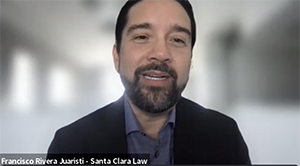
On March 8, 2023, Santa Clara Law’s International Human Rights Clinic co-hosted a virtual side event during the Inter-American Commission on Human Rights’ 186th Period of Sessions with the International Human Rights Clinic of the University of Illinois Chicago Law School (UIC). The event offered training on the use of a groundbreaking new environmental human rights treaty – the Escazú Agreement – in environmental human rights litigation before the Inter-American Human Rights System (IAHRS), based on a new litigation toolkit developed by students from both clinics. The toolkit guides advocates to incorporate legal arguments based on the specialized protections of the Escazú Agreement to defend environmental human rights in the Americas and the Caribbean.
The Escazú Agreement is a new regional treaty that implements the environmental access rights recognized in Principle 10 of the Rio Declaration, and it is also the first environmental treaty to explicitly protect environmental human rights defenders, a highly threatened group, and require special protections for vulnerable groups. The Agreement entered into force on April 21, 2021. While the treaty was adopted by the United Nations Economic Commission for Latin America and the Caribbean and is therefore not part of the Inter-American Human Rights System (IAHRS), advocates can still incorporate it when litigating environmental cases before the system. The webinar provided timely insight as the United Nations and other international bodies have recently recognized and reaffirmed the human right to a healthy environment and the need to examine what governments must do to protect rights in the face of the climate crisis.
 During the event, Santa Clara Law IHRC Director Francisco Rivera and Deputy Director Britton Schwartz presented with UIC Law Professor Sarah Dávila on the status of environmental human rights in the Inter-American System and the content of the Agreement to explain how the toolkit could support advocates to use the specialized environmental protections in the Agreement in IAHRS litigation to deepen the existing legal framework. Through this webinar, the professors informed the audience how they can use the toolkit to advocate for vulnerable communities that are directly affected by environmental harms or projects that cause environmental harm. The speakers recognized that while the Agreement can be used to strengthen the existing IAHRS normative framework on the right to a healthy environment, defenders must be able to vindicate the rights of vulnerable communities and their own right to defend environmental rights. As this remains an emerging issue in environmental human rights, the Clinics hope that this toolkit provides significant guidance for those seeking to defend and protect vulnerable communities and the environment they live in. A recording of the webinar can be found here, and the Escazú Agreement Toolkit can be found here.
During the event, Santa Clara Law IHRC Director Francisco Rivera and Deputy Director Britton Schwartz presented with UIC Law Professor Sarah Dávila on the status of environmental human rights in the Inter-American System and the content of the Agreement to explain how the toolkit could support advocates to use the specialized environmental protections in the Agreement in IAHRS litigation to deepen the existing legal framework. Through this webinar, the professors informed the audience how they can use the toolkit to advocate for vulnerable communities that are directly affected by environmental harms or projects that cause environmental harm. The speakers recognized that while the Agreement can be used to strengthen the existing IAHRS normative framework on the right to a healthy environment, defenders must be able to vindicate the rights of vulnerable communities and their own right to defend environmental rights. As this remains an emerging issue in environmental human rights, the Clinics hope that this toolkit provides significant guidance for those seeking to defend and protect vulnerable communities and the environment they live in. A recording of the webinar can be found here, and the Escazú Agreement Toolkit can be found here.